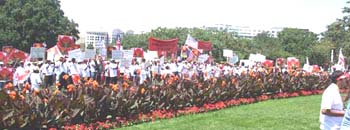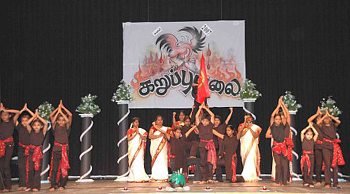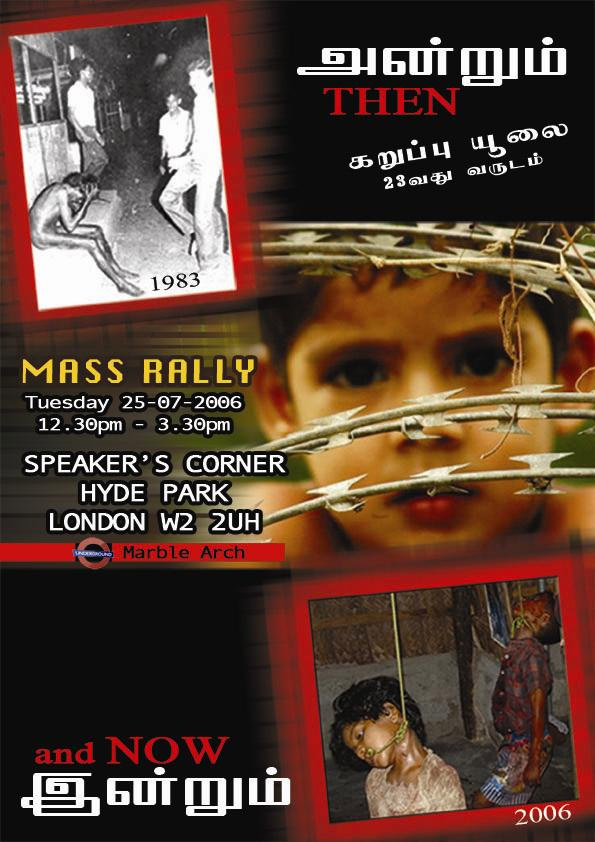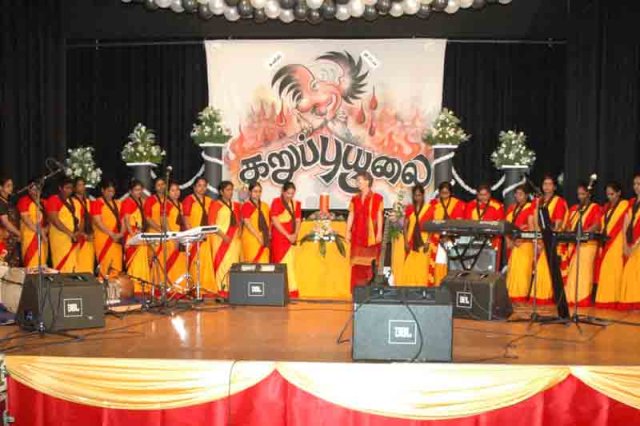Nadesan Satyendra
The matters presented here in Genocide'83 constitute, at the lowest, prima facie evidence, sufficient to warrant an indictment for genocide against the Sri Lanka authorities for the crimes committed against the Tamil people in July and August 1983. Paul Sieghart in his Report of a Mission to Sri Lanka on behalf of the International Commission of Jurists and its British Section, Justice, March 1984, concluded: "Clearly this was not a spontaneous upsurge of communal hatred among the Sinhala people.. It was a series of deliberate acts, executed in accordance with a concerted plan, conceived and organised well in advance. But who were the planners?... Communal riots in which Tamils are killed, maimed, robbed and rendered homeless are no longer isolated episodes; they are beginning to become a pernicious habit." [see 1956, 1958, 1961, 1974 and 1977]
The International Commission of Jurists Review declared in December 1983 - "Under the Convention on the Prevention and Punishment of the Crime of Genocide, acts of murder committed with intent to destroy, in whole or in part, a national, ethnical, racial or religious group as such are considered as acts of genocide. The evidence points clearly to the conclusion that the violence of the Sinhala rioters on the Tamils (in July/August 1983) amounted to acts of genocide."
Velupillai Pirapaharan, Leader of Tamil Eelam in an interview with Anita Pratap, March 1984 concluded - "..Our view is that the July holocaust was a pre-planned, well-orchestrated genocidal pogrom against the Tamils, carried out by the racial elements of the ruling party. Initially, these racist elements did attempt to put the whole blame on the LTTE. Then, suddenly, they blamed the left parties for the riots. But in fact, it is the racist leaders of the present government who should take responsibility for this tragic loss of life."
In 1985, Leo Kuper commented on the failure of the United Nations Sub Commission on Human Rights to condemn the genocidal attack on the Tamil People - "....there were also political currents observable in the alignment of members, though I could not altogether fathom the geo political considerations involved. In the end a very mild resolution was passed calling for information from the Sri Lanka government and recommending that the commission examine the situation at the next meeting in the light of the information available. There was, however, only a bare majority for the resolution (10 for, 8 against and 4 abstaining). It is unfortunate that the United Nations did not take a firm stand at this stage..." Leo Kuper in Prevention of Genocide, 1985
That even this mild resolution adopted on 5 September 1983, calling upon Sri Lanka to provide information was opposed by 8 states with another 4 abstaining is not without significance and serves to reinforce the validity of that which Velupillai Pirabakaran declared in his Maha Veerar Naal address on 27 November 1993 "...We are fully aware that the world is not rotating on the axis of human justice. Every country in this world advances its own interests. Economic and trade interests determine the order of the present world, not the moral law of justice nor the rights of people. International relations and diplomacy between countries are determined by such interests. Therefore we cannot expect an immediate recognition of the moral legitimacy of our cause by the international community...In reality, the success of our struggle depends on us, not on the world. Our success depends on our own efforts, on our own strength, on our own determination..."
Genocide is a crime which transcends national frontiers. Those responsible for Genocide '83 both within the then Sri Lanka government and outside it, should be charged and punished according to law.
|
| The Record Speaks... |
| Prologue |
| On 24 July 1983, and the succeeding weeks, thousands of Tamils were killed... |
| Tamil owned businesses scientifically extracted and burned... |
| Widespread attacks in Colombo, Kandy, Matale, Nuwara Eliya, Badulla and elsewhere... |
| Badulla - a case study of mob frenzy and State terror.. |
| Hindu temples burnt... |
| More than one hundred thousand Tamils in improvised refugee 'camps'.. |
| An eye witness account of events in Colombo by an inmate of a refugee camp... |
| Displaced Tamils from the Sinhala South escape by ship to the Tamil homeland in the North... |
| Government security forces killed at random in the Tamil homeland in North and East... |
| Fifty three Tamil prisoners murdered in Welikade Prison, in government custody.. |
| Eye witness account of Welikade prison massacre - S.A.David.. |
| And the Sri Lanka security forces looked the other way.. |
| Whilst henchmen of senior Ministers were seen leading the attack on the streets... |
| Government failed to condemn and President Jayawardene expressed no sympathy when he belatedly addressed the nation on 16 July 1983... |
| Attack renewed with vigour the day after Sri Lanka President Jayawardene spoke... |
| Genocide'83 was a carefully planned attack & Sri Lanka Minister Ananda Tissa De Alwis said so on 29 July 1983... |
| But who were the planners of this carefully conceived contingent plan?... |
| A contingent plan which required considerable organisational resources... |
| A contingent plan which required thousands to obey orders to kill and burn... |
| Who were the planners who were in a position to direct and influence the police and the army?. |
| The features of the planners emerge from the nature of the plan... |
| Sri Lanka claimed the attacks were left inspired attacks against the Government & Sri Lanka President's Address to the Nation on 22 August 1983... |
| Sri Lanka engaged in a cover up and dishonoured its pledge to the UN to hold an inquiry... |
| Sixth Amendment to Sri Lanka Constitution violates freedom of expression and unseats Tamil MPs... |
| Tamil United Liberation Front Leader Amirthalingam wrote to Sri Lanka President, J.R.Jayawardene on 10 August 1983 - in vain... |
| Expropriation of Tamil property... |
| A plan presupposes objectives and the objective of the plan was clear - terrorise the Tamil people into submission... |
| Genocide is a crime and the perpetrators of Genocide'83 must be punished |
Remembering Black July '83 - Anniversaries: 1984 todate |
| July 2007 |
| கனடாவில் கறுப்பு ஜூலை நினைவாக 'சாவிலும் வாழ்வோம்", 25 July 2007 
|
| '83 Black July Rememberance Vigil in Melbourne 25 July 2007 
|
| Peace Rally by Tamil Americans - Capitol Hill, Washington , 23 July 2007 - "We, the Tamil Americans, hereby proclaim that Eelam Tamils constitute a Nation" 
|
| சுவிசில் கறுப்பு ஜூலை நினைவாக "சாவிலும் வாழ்வோம்" நினைவு கூரல், 22 July 2007 
|
| July 2006 |
| Thousands gather in Hyde Park remembrance, 25 July 2006 |
| Sri Lanka's Week of Shame - July 1983 Massacre: Long Term Consequences, Brian Senewiratne, 23 July 2006 |
| Black July remembrance held in Australian cities, July 2006 |
| சாவிலும் வாழ்வோம் கறுப்பு யுலை நினைவு கூர்வு [சிட்னியல் கறுப்பு யுலை நினைவு நிகழ்வில் ஆற்றிய உரை] - M.Thanapalasingham, 23 July 2006 |
| Ana Pararajasingham - Remembering Black July 1983 - Address at a public meeting in Sydney attended by Australian Parliamentarians, 23 July 2006 |
| Black July in London - Mass Rally at Hyde Park, London on 25 July 2006 organised by Tamil Youth Organisation, United Kingdom 
|
 Black July in Switzerland - July 2006 சுவிசில் நடைபெற்ற கறுப்பு யூலை - 2006 நிகழ்வின் படத்தொகுப்பு Black July in Switzerland - July 2006 சுவிசில் நடைபெற்ற கறுப்பு யூலை - 2006 நிகழ்வின் படத்தொகுப்பு |
On 23rd Anniversary of Genocide'83 Precursor to what was to befall on Tamils on Black July in 1983, Esan Satkunarajah, 23 July 2006 |
On 23rd Anniversary of Genocide'83 Remembering Black July Of The Failed State, Dr J.S.A Jeyaretnam, 12 July 2006 On 23rd Anniversary of Genocide'83 Former Sri Lanka President J.R. Jayawardene's liability - Statement by Asian Human Rights Commission 17 July 2006 together with comment by tamilnation.org |
On 23rd Anniversary of Genocide'83 Black July 1983: An Epochal Episode In Tamil Freedom Fight, Dharakan, 30 June 2006 |
| July 2004 |
| On 21st Anniversary of Genocide'83 Commemorated in Jaffna - 25 July 2004 - "The post Black July witnessed an exodus of tens of thousands of Tamils to western countries and neighbouring Tamil Nadu state in India as refugees"... |
| On 21st Anniversary of Genocide'83 - Revisiting the White Anglo Saxon Protestant (WASP) Editorials on the anti-Tamil riots of July 1983 - Sachi Sri Kantha, 24 July 2004 |
| On 21st Anniversary of Genocide'83 Sri Lanka President Kumaratunga's 'Apology' for Genocide'83, 25 July 2004 |
| July 2003 |
| On 20th Anniversary of Genocide'83 - Twenty years on - riots that led to war - Frances Harrison, BBC correspondent in Colombo, 23 July 2003 |
| July 2001 |
| On 18th Anniversary of Genocide'83 - "The Memory of July 1983 Anti-Tamil Pogrom Must Remain High" - Asian Human Rights Commission |
| July 2000 |
| On 17th Anniversary of Genocide'83 - State Terror: Black July '83 Revisited - Ana Pararajasingham, 23 July 2000 |
| July 1999 |
| On 16th Anniversary of Genocide'83 எண்பத்து முன்று ஜூலை.. |
| July 1998 |
| On 15th Anniversary of Genocide'83 - Year 16: the Holocaust Continues - S Sathananthan & Sabiha Sumar, 28 July 1998 |
| On 15th Anniversary of Genocide'83 - The Charge is Genocide - the Struggle is for Freedom... Nadesan Satyendra, 18 July 1998 |
| July 1993 |
| On 10th Anniversary of Genocide'83 "No inquiry, leave alone an impartial one, has been held into the admittedly planned violence against the Tamil people" - Letter to UK Prime Minister from International Federation of Tamils, 24 July 1993 |
| July 1984 |
| On 1st Anniversary of Genocide'83" No impartial inquiry has taken place" - more than 50 British Members of Parliament, in the Guardian, 28 July 1984 |